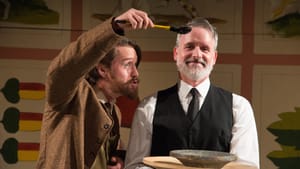Stay in the Loop
BSR publishes on a weekly schedule, with an email newsletter every Wednesday and Thursday morning. There’s no paywall, and subscribing is always free.
Who's corrupt?
Gogol's 'Inspector General' by Idiopathic Ridiculopathy Consortium (1st review)

Irresponsible civic leaders! Corrupt government insiders! Dirt-stupid farmers! Deluded youth! Small town cover-ups! Bribery! Pompous self-invention! Long, unpronounceable names! Idiopathic, Ridiculopathic. And don’t blame the looking glass if your mug is crooked.
No, I am not referring to front page news, the presidential campaign, moronic sitcoms, American Hustle and The Big Short, Putin’s Russia, or your daily interactions with bureaucracies and your family. I am summing up the basic themes in Nikolai Gogol’s always relevant 1836 play, The Inspector General, which is given as much to do as can be done, and more, in this animated, quick-step, rollicking production. The Idiopathic Ridiculopathy Consortium Players tie it all tightly together in the shoebox-sized Walnut Street Studio 5 Theater.
You probably know the plot, even if you have never seen the play. A provincial town not far from St. Petersburg is run by an ethically challenged, but bright, bombastic mayor and his cadre of crooked civic cronies: judge, physician, school inspector, charity warden, postmaster. They hear of the impending visit of a state inspector general and immediately conspire to do the least right things possible to cover up their ongoing schemes —and then blatantly bribe him.
It soon becomes clear that everyone in the town is on the take and the so-called inspector general — a fashionably dressed, fatuous 23-year-old, ne’er-do-well son of an aristocrat — is neither a real inspector nor a stranger to the arts of the deal, fixes, or flirtation with the mayor’s wife and daughter. Invited to dance, he extends his palm, and the more it is greased, the greedier he grows, until he gets on his horse and gallops away.
A dancing mise-en-scène
Though it runs for almost two hours with no intermission, this production is so much fun that I never looked at my watch. Director Tina Brock (who also did the sound design and, with Mark Williams, the props) expertly choreographs the actors around the small stage. The sequences are neatly fitted with fast-gabbing, fluidly gesturing actors whose audience-aware grimacing and group poses create a mise-en-scène that dances like the interplay of syllables in the names of the characters: Luka Lukich Khlopov, Ivan Alexandrovich Khlestakov, Anton Antonovich Skvoznik-Dmukhanovsky and his wife, Anna Andreevna. Fortunately, there is a servant named Osip — a sign of Gogol’s genius wit for punctuating the pretensions of patronymic over-identification. (Gogol was, by the way, Ukrainian, not Russian, a crucial distinction that is often overlooked.)
There are 21 characters in the production and, except for the mayor (Jack Tamburri) and the inspector general (Andrew Carroll), all of the actors play three roles. Outfitted in clever, realistic yet subtly exaggerated costumes by Janus Stephanowicz, part of the joy of the evening is to see the actors alter their voices, posture, and expressions as they assume each new guise. With near cartoonish periwigs, moustaches, goatees, and hats, the thin line between illusion and transparency in dress underscores the self-deceiving psychology of the deceivers. (Hello, 2016 elections.)
Chicanery in a looking glass
The mayor and the pseudo-inspector are meant to mirror each other. The mayor is a complete politician and Tamburri, tall and polished, never wavers in his control of each scene (though Gogol hands him some asides that are too obvious for modern tastes). Khlestakov, in a spiffy but worn tweet suit and stripped tie, is part fool and a complete opportunist, glib and as shallow an ungrateful trust-fund kid. Carroll, in a voice that rounds out all the longish speeches he has to make, seizes Khlestakov’s lack of self-awareness and we flow with his ease at being unscrupulous to the point of realizing how much we despise him. After all, in this town everyone’s a scoundrel — and for sale.
Brock blocks all of the actors into staggered lines that allow them to display their different profiles, body shapes, and eccentric costumes. I lost track of the dialogue in one scene as I watched the six hands of three actors array themselves in quick, finger curled movements as if they were all playing an invisible game of cat’s cradle. In another scene, the characters shuffle around each other in an odd, place-changing walk-dance.
Eye-rolling doubt
Of course, we all know the whole thing is a farce, so the eye-rolling doubt of the mayor’s daughter, Maria (Francesca Piccioni), is predictable but appealing — and nowhere to be found when Piccioni appears as the green-velvet-gowned, owl-glassed, clueless school inspector. Tom Dura and Bob Schmidt, as the dim witted landowners Dobchinsky and Bobchinsky, knowingly play perfect rubes, although Gogol made the roles to be rubes with imperfections. When they independently transform into a constable and the postmaster, it makes perfect sense.
Jennifer MacMillan puffs out her cheeks and speaks from her throat as the goateed warden of charities, but then becomes the mayor’s flighty housewife and, later, a wronged locksmith’s widow. Similarly, Christina May is alternately forceful and meek as the district physician and chief of police before becoming an irate shopkeeper who demands that the corruption cease. Naturally, she will never get to tell it to the incompetent puppet-carting judge, Paul McElwee, who also plays the dutiful and sometimes sly Osip.
All of which plays in and around designer Lisi Stoessel’s set, which has ten flat painted panels that allow the actors to force the doors open and slip them quickly, never interrupting the action. The quirky, intermitted music might remind you of the soundtrack to a silent comedy.
My only real complaint is that in Gogol’s time, as in ours, the official, conniving bastards never get what’s coming to them.
For Mark Cofta's review, click here.
What, When, Where
The Inspector General by Nikolai Gogol. Tina Brock directed. Idiopathic Ridiculopathy Consortium. Through February 28 at Walnut Street Theatre Studio 5, 825 Walnut Street, Philadelphia. 215-285-0472 or idiopathicridiculopathyconsortium.org.
Sign up for our newsletter
All of the week's new articles, all in one place. Sign up for the free weekly BSR newsletters, and don't miss a conversation.

 AJ Sabatini
AJ Sabatini